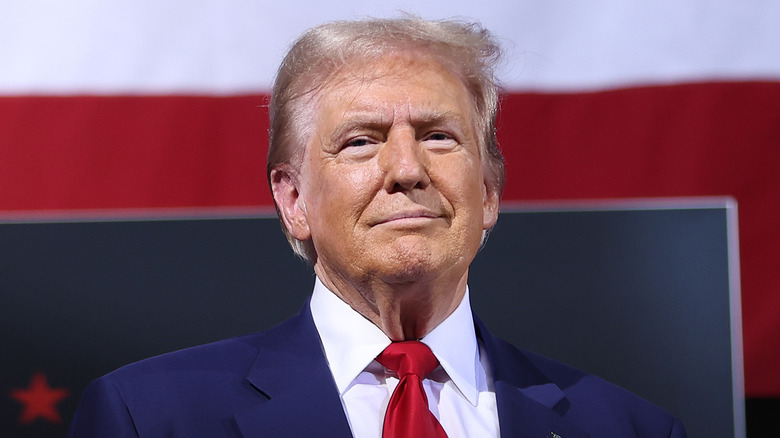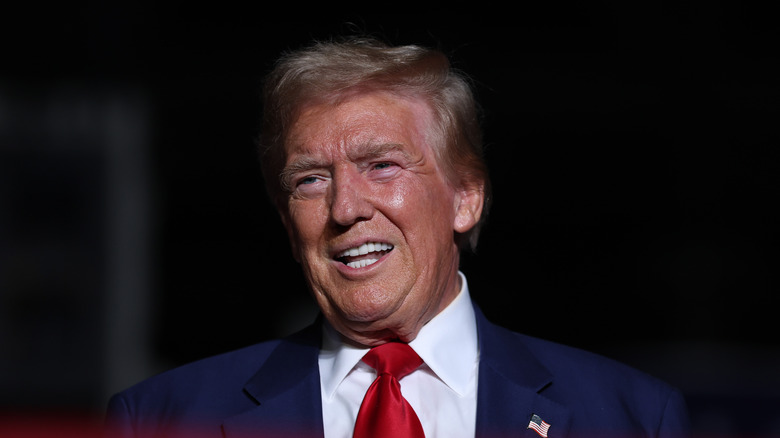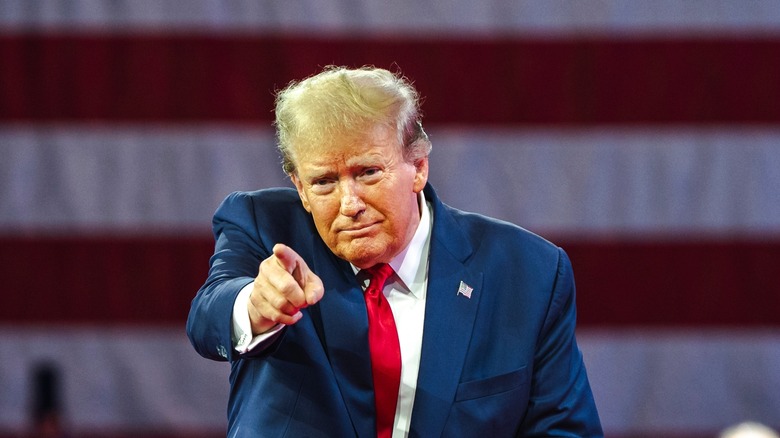Donald Trump Has Run Into Money Problems Due To The Cost Of His Rallies
Any way you slice it, running for president is an incredibly expensive proposition: buying television ad spots, paying campaign staffer salaries, and hiring security for public events can easily cost hundreds of thousands of dollars (and that's not even counting the potential legal trouble for using copyrighted songs without permission). It's no surprise, therefore, that Donald Trump has racked up a staggering amount of outstanding debt in pursuit of the presidency, with much of that debt stemming from his nationwide campaign rallies. The ever-increasing number of overdue bills he has accumulated represents some serious money troubles for the former president, and many of them aren't even from Trump's 2024 campaign; a Newsweek investigation revealed that multiple U.S. cities are still waiting to be paid from his first presidential run in 2016 and his second in 2020 — to the tune of over $700,000.
Unfortunately, these unresolved debts aren't just a burden for city governments; they also negatively impact the tax-paying residents of those municipalities, which has led some city councils to take action. As a spokesperson for El Paso, Texas, told Newsweek: "On Nov. 23, 2020, the City Council unanimously took action to hire the Law Offices of Snapper L. Carr to advocate in the City's interest in the collection of the outstanding invoices. The City continues to seek the payment of these past due expenses, so City taxpayers do not continue to have to bear the cost." Although El Paso is at the forefront of fighting to collect rally-related payments from Trump's campaign, there is a long line of other cities behind them.
At least a dozen cities may want their piece of the Trump pie
In 2019, The Center for Public Integrity released a list of outstanding bills Donald Trump's campaign had incurred, including the over $470,000 invoice from El Paso. Among the oldest debts on the list is a $65,124.69 bill from Spokane, Washington stemming from a rally in May 2016. The then-city council president, Ben Stuckart, said of the bill: "I would expect anyone who is billed for police services to pay their fair share." The list included smaller bills from eight other cities, all of which were still waiting to be paid.
However, plenty of other municipalities also invoiced reimbursement requests to Trump. For example, ABC News detailed the struggles that Minneapolis, Minnesota faced in trying to collect on a $530,000 bill for rally-related services in 2019. According to the article, Trump's campaign threatened to sue over the massive sum, which they felt constituted extortion. The request for payment was withdrawn, but Minneapolis mayor Jacob Frey was still adamant that the campaign should have settled the bill, tweeting: "My position remains unchanged: Minneapolis taxpayers should not have to bear the brunt of operating costs resulting from the president's visit."
However, it's important to note that not every city that has hosted a Trump rally has asked for compensation. As The Center for Public Integrity explains, some of Trump's campaign stops even have policies that prohibit sending such invoices. Other cities simply don't bill candidates for public safety services as a matter of general practice. For example, in 2022, WGEM reported that the cost of a Trump rally held in Quincy, Illinois, came to over $11,000 in expenses such as overtime pay for city employees. However, Quincy is not among the cities publicly demanding Trump pay these costs.
Unpaid rally bills are just a small part of Trump's financial obligations
Although Donald Trump's campaign rally expenses are massive, they are nothing compared to his legal bills. For example, a March 2024 Washington Post report shared eye-opening figures from campaign financial documents: political committees associated with the former president had already spent around $16.7 million in legal fees just three months into the year. That number already seems impossibly high, but the total from the start of his 2024 campaign until March was even more shocking: $86 million.
Unfortunately for Trump, his legal bill situation has only grown more complex and dire. For example, as The New York Times reported in June 2024, his PAC's available cash reached a major low, down to just $4 million. That certainly isn't pocket change, but as the article explains, it wasn't enough to cover a month of legal expenses, which averaged about $5 million. Speaking on behalf of Trump, spokesperson Steven Cheung said: "President Trump's lawyers will continue to fight all of these Biden trials and they will continue to be appropriately compensated for their time and efforts." These legal bills make funding his campaign even more complex than his outstanding political rally expenses, and only time will tell exactly how Trump will wipe his debt slate clean.


